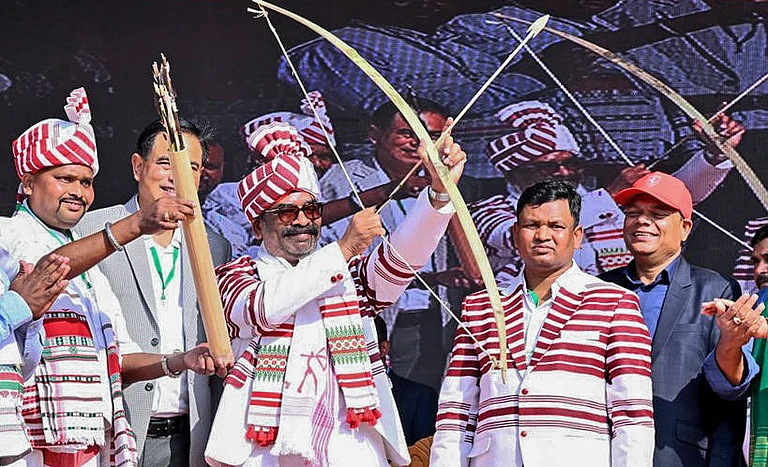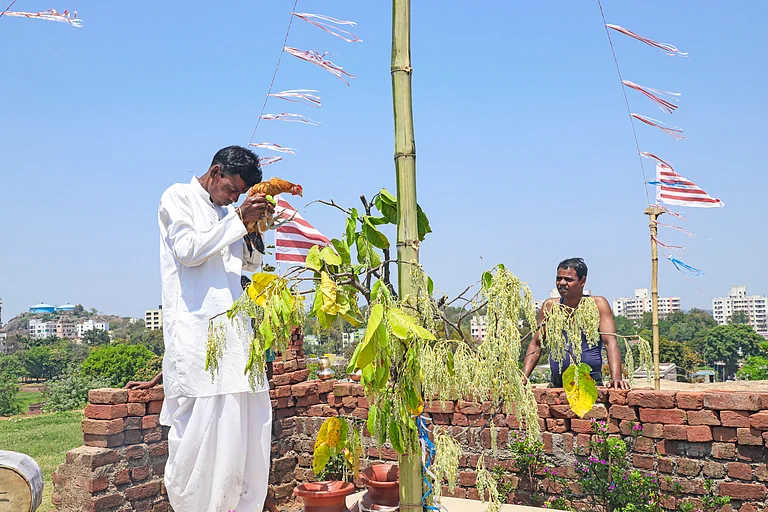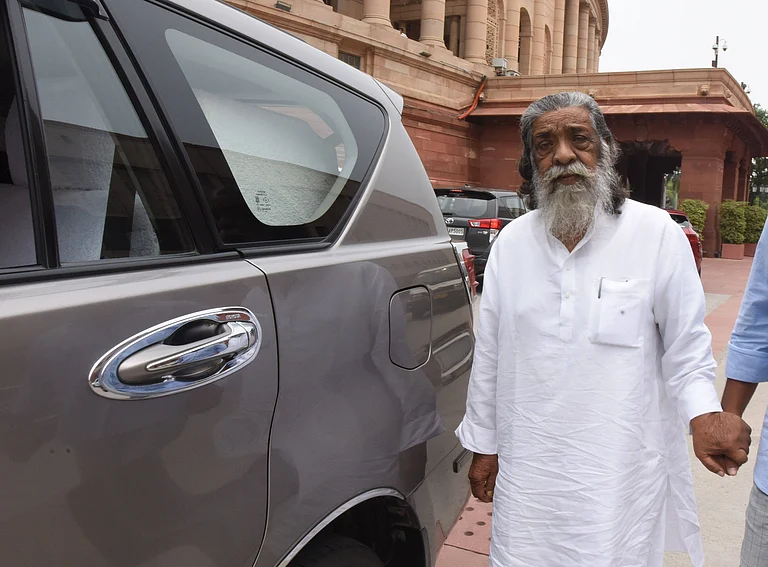In the early 1960s, in the southern hills of Bihar (now Jharkhand), a young Adivasi named Shibu Soren created a distinct tune on the dugdugiya, a traditional tribal percussion instrument. The beat signaled an emergency, a call for the community to gather. It was more than a sound. It was a summons to resistance.
This act was part of a growing agitation against the mahajans and sahukars (moneylenders) led by Soren under the banner of Jharkhand Mukti Morcha (JMM)—a grassroots movement for the liberation of Jharkhand. By the 1990s, this movement had evolved into a political party, with the formation of Jharkhand state as its central demand.
Twenty-five years after Jharkhand’s creation, that same spirit still animates the JMM. In 2024, the party led a ‘Grand Alliance’ with the Congress and Rashtriya Janata Dal to victory in the state Assembly election. Hemant Soren, Shibu’s son, became Chief Minister with the seat tally ever won by a Jharkhandi party in Jharkhand.
Soren, known widely as Guruji or Disom Guru (Santhali: “Leader of the tribal world”), passed away at 81 in Delhi’s Sir Ganga Ram Hospital while undergoing treatment for kidney-related complications.
Soren’s first tryst with elections failed, when he lost from the Dumka seat in 1977, but he resurrected to victory in 1980, then retaining the seat in 1989, 1991 and 1996. He represented JMM in the Rajya Sabha in 2002, but resigned to contest, successfully, in the Dumka Lok Sabha by-election, which he retained in 2004 and 2014. He was Union Minister for Coal and Steel in the first United Progressive Alliance government and had three brief stints as Chief Minister in 2005, 2008 and 2009. He died while serving his third Rajya Sabha term.
Shibu Soren’s life—marked by struggle, resilience and a deep connection to his people—offers a window into the experiences of Jharkhand’s indigenous communities: their exploitation, mobilization, and resistance. Born in 1944 in Nemra, a village in Ramgarh district to Santhali parents, Soren’s political consciousness was shaped early. According to his Hindi biography, Samar Shesh Hai, his father, a schoolteacher, was killed by moneylenders for opposing their illegal acquisition of Adivasi land.
Moneylending in Jharkhand was not rooted in the zamindari system. It was the business-owning class, not landowners, who dominated moneylending in the state.
The practice was shaped by baniyas and sahukars arriving from north India in the late 18th and early 19th centuries, following British colonialists into the hills and forests of Jharkhand.
Commercial liquor was systemically introduced and promoted, pulling Adivasi communities, traditionally reliant on barter, into debt traps. Many borrowed to fund the alcohol habit, which often meant mortgaging land that was lost in auctions when they could not repay. That is how ownership transferred from Adivasi to British hands—or wealthy moneylenders.
According to Samar Shesh Hai, a book on the life of Shibu Soren by journalist Vinod Kumar, Soren’s father was one of the first to recognise the weaponisation of liquor by mahajans to dispossess Adivasis in the North Chota Nagpur plateau. This awareness shaped Soren’s lifelong political opposition to the liquor trade, in which prohibition featured prominently.
Two close associates of Soren’s, Supriyo Bhattacharya, the JMM general secretary, and Kamal Nayan Singh, head of the party’s intellectual wing, told these authors how deeply his father’s struggles informed his political consciousness.
Kamal Nayan observed that in Santhal Parganas, Soren’s political base, moneylending was so normalised that it was seen as fated. When Soren began mobilising people to resist this tyranny, he became more than a leader—an avatar. Such association of the material with the supernatural is a common element of tribal culture. As with Birsa Munda, revered as Bhagwan Birsa Munda, who resisted British colonialism and shaped the Sarna religion, Soren came to hold spiritual meaning among people.
In the 1960s, Soren established Pokhariya Ashram in the Tundi block of Bokaro district. From this modest base, he began documenting Adivasi exploitation by moneylenders, devising a unique guerrilla tactic called Dhankatni—literally, 'harvesting rice'. Raiding parties consisting of dispossessed families would reclaim their crops from disputed fields taken over by sahukars. The strategy emphasised self-assertion—the exploited were urged to fight for themselves.
Finally, in 1972, he laid the foundation for JMM, with Binod Bihari Mahto and Marxist leader AK Roy.
Soren framed the exploiting classes as outsiders and lobbied fiercely to strengthen the Chota Nagpur Tenancy (CNT) Act, which prohibits the sale or registration of Adivasi land to non-Adivasis in Jharkhand. His insistence on land rights became a foundational pillar of JMM politics and the state’s tribal identity.
At Cambridge University, a framed photo of the JMM flag hangs next to Nelson Mandela’s African National Congress flag—a powerful nod to the global resonance of Soren’s struggles for justice.
Recalling his role as the guiding force behind numerous agitations for statehood, JMM general secretary Supriyo Bhattacharya described Soren as the “all-accepted leader of such movements”. “Guruji is like the oldest banyan tree in Kolkata’s Botanical Garden,” he said, “with many movements branching from the same trunk. Each branch is a reflection of his philosophies”.
Jaipal Singh Munda of the Jharkhand Party, a member of the Constituent Assembly, was the first to demand a separate state—present-day Chhattisgarh—carved out from the erstwhile Bihar, Bengal, Odisha and Madhya Pradesh regions. Soren built on that vision, expanding its political scope through alliances with leaders of other statehood movements. Some even suggest a close personal and political relationship between Soren and K Chandrashekhar Rao, who led the movement for Telangana statehood.
Kumar Saurav, a worker at JMM’s central office at Morabadi, Ranchi, first met Soren as a child when he received a prize from him at a school function. “For Guruji, the crowd was his nutrition,” he said. “Even in later years, he would sit under the mango tree at his home for two hours every day, meeting everyone who came.” An open-door policy, rare among leaders today, speaks to his lifelong commitment to people.
Bhattacharya notes that Soren’s lifestyle was deeply rooted in the Adivasi values of hard work and simplicity. He farmed all his life and ate simply—dal, rice, spinach, a dry vegetable and chutney were his staples. He strictly asked party members, instructing MLAs and MPs to stay among the people—not isolate themselves in Ranchi or New Delhi.
After the creation of Jharkhand in 2000, Soren’s political focus shifted to developing of the state. “His message evolved from ‘sacrifice yourself for the state’ to ‘dedicate yourself to the state,’” Bhattacharya said.
He added that Soren had studied Marx, Mao, Gandhi and Lohia, thinkers he believed were united by a common thread: the centrality of struggle. Soren adopted struggle as the core of his political and moral philosophy, with a primary goal to empower Adivasi communities.
His election speeches rarely focused on winning: they revolved around the lives and struggles of his people, whom he consistently urged to value and protect their land, warning against adopting consumerist, extractive lifestyles as they were alien to Adivasi ways. This explains the significant lows in his political career, including the defeat in Tamar Assembly constituency, while he was Chief Minister, in 2009.
Recently, a speech Soren delivered in 2012 at Nagri, a hamlet near Ranchi, was widely circulated after villagers protested against a proposed campus of the Rajendra Institute of Medical Sciences (RIMS). Activists recall how he passionately urged farmers to “get back to harvesting,” invoking both resistance and self-reliance.
His voice echoed again when the Centre announced the auction of 41 coal blocks in five states, including 20 in Jharkhand, many home to thriving indigenous communities. The Jharkhand government challenged the auctions in the Supreme Court and, as Rajya Sabha Member, Soren raised the Centre’s economic blockades against states for delayed mining revenue payments—the reverse of typical narratives where states bear the brunt of central financial penalties.
Recounting JMM’s early challenges, Kamal Nayan shared a telling anecdote: election day in tribal areas was often treated like a festival. Voters started their morning with local rice beer, dressed up and danced in processions towards polling booths—only to arrive after voting time. This, too, reflects a deeper truth of the long and patient work required to connect indigenous communities with modern-day democratic institutions—a gap Soren and his party tirelessly worked to bridge.
Though his life was inextricably rooted in Adivasi struggles, when he gained power, Soren built an inclusive Jharkhand—never leaving behind those who shaped the soul of his movement. Supriyo Bhattacharya remembered him after paying his last respects as a leader who never “enjoyed power”. In Shibu Soren’s passing, Jharkhand has lost not just its founder, but the living embodiment of the struggles of its indigenous people.
























